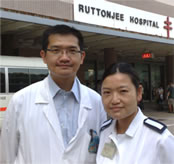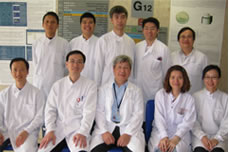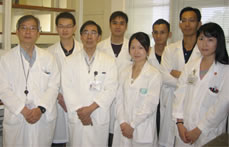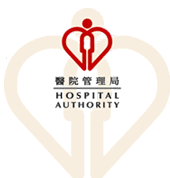 |
 |
 |
| |
 |
| |
|
| |
 uman swine influenza has spread around the world since the earliest cases were reported in Mexico, and it has now become a global pandemic. Hong Kong's first imported case was confirmed on 1 May, and a community outbreak subsequently started around mid-June. In response, the HA has put contingency measures into place, including the opening of Designated Flu Clinics. All of us have been incredibly busy during these exceptional times, not just with our routine daily duties, but also with other work related to our fight against the disease. uman swine influenza has spread around the world since the earliest cases were reported in Mexico, and it has now become a global pandemic. Hong Kong's first imported case was confirmed on 1 May, and a community outbreak subsequently started around mid-June. In response, the HA has put contingency measures into place, including the opening of Designated Flu Clinics. All of us have been incredibly busy during these exceptional times, not just with our routine daily duties, but also with other work related to our fight against the disease.
We interviewed some of our colleagues in different hospitals and various positions in late May, and we asked them to share their experiences and feelings. Whether they happen to be front-line doctors or nurses, or medical technologists or general services assistants working behind the scene, all of them are playing important roles and fulfilling their duties outstandingly and with a high spirit of professionalism.
Our Chairman, Mr Anthony Wu, and Chief Executive, Mr Shane Solomon, have expressed their heartfelt gratitude to all of you via this issue of HASLink, and also hope that we will continue to work closely together to beat human swine influenza.
|
|
|
|

 The HA is facing tough challenges, due to the further spread of human swine influenza within the community and the growing number of confirmed cases. I feel that our front-line colleagues are under immense pressure. Yet not a single one of you working in the isolation wards, Designated Flu Clinics, A&E or other departments of our hospitals and clinics is feeling afraid. Instead, you are bringing your professionalism and devotion to your work into full play. I very much thank all of you. Without you, the HA could hardly be in a position to safeguard the health of our fellow citizens. At the same time, we are always standing behind you, and providing you with back-up support. If you encounter any difficulties, please feel free to let us know. We are here and ready to listen to your views and provide you with our support. It is also important that you are taking all necessary measures to prevent outbreaks in our wards and hospitals. Please take good care of yourself and your family. Let's resolve to continue fighting against human swine influenza! The HA is facing tough challenges, due to the further spread of human swine influenza within the community and the growing number of confirmed cases. I feel that our front-line colleagues are under immense pressure. Yet not a single one of you working in the isolation wards, Designated Flu Clinics, A&E or other departments of our hospitals and clinics is feeling afraid. Instead, you are bringing your professionalism and devotion to your work into full play. I very much thank all of you. Without you, the HA could hardly be in a position to safeguard the health of our fellow citizens. At the same time, we are always standing behind you, and providing you with back-up support. If you encounter any difficulties, please feel free to let us know. We are here and ready to listen to your views and provide you with our support. It is also important that you are taking all necessary measures to prevent outbreaks in our wards and hospitals. Please take good care of yourself and your family. Let's resolve to continue fighting against human swine influenza!

 Our mission is to slow the spread of human swine flu and to protect the population from sickness and death. This is an opportunity to show the community that the HA can be trusted to keep the people healthy and protect them against this new threat. I thank front-line colleagues who have worked so well to triage and test potential cases, and treat confirmed cases. I know there are many, many others in the HA family who have also been quietly and wonderfully supporting our response to this pandemic. The battle will continue, and I seek your cooperation to continue to respond flexibly as we understand the disease better and our response changes. I am very proud of how our response has been organised and delivered, and know that working together we can keep the impact of human swine flu to a minimum until a vaccine is available. Thank you again for your professional service.
Our mission is to slow the spread of human swine flu and to protect the population from sickness and death. This is an opportunity to show the community that the HA can be trusted to keep the people healthy and protect them against this new threat. I thank front-line colleagues who have worked so well to triage and test potential cases, and treat confirmed cases. I know there are many, many others in the HA family who have also been quietly and wonderfully supporting our response to this pandemic. The battle will continue, and I seek your cooperation to continue to respond flexibly as we understand the disease better and our response changes. I am very proud of how our response has been organised and delivered, and know that working together we can keep the impact of human swine flu to a minimum until a vaccine is available. Thank you again for your professional service. 
|
|

Dr Woo says candidly that he was a bit surprised when he learned that a Mexican patient suspected of having human swine influenza had just been admitted to Ruttonjee Hospital in Wanchai. That was because people arriving in Hong Kong with flu-like symptoms were supposed to be sent to Princess Margaret Hospital instead. "I wondered why I was so 'lucky' to be asked to manage the first case in Hong Kong," he recalls.
Still, Dr Woo and his colleagues at the Hospital displayed great professionalism and a strong team spirit. "The colleagues working in the Accident and Emergency Department, the doctors and nurses responsible for infection control, and the Microbiology Department at Pamela Youde Nethersole Eastern Hospital all cooperated closely together, even though they were in different departments. They reacted promptly and they handled every procedure with great care," he says. Dr Woo particularly praises Ms Florence Fung, the nurse who accompanied him to the isolation ward to carry out medical procedures, such as taking blood and nasopharyngeal aspirate samples from the patient. "We encouraged and helped each other to check that we were wearing our personal protective equipment properly. And Ms Fung was outstanding in her work," he says. "In fact, the smooth way we dealt with the situation was made possible by the contributions everyone made."
|
| |
|
|
| |
 |
|
| |
 |
Dr Woo Yu-cho and Ms Florence Fung |
|
|

The experience of helping to handle the human swine influenza case has left a deep impression on Ms Fung, whose work has been highly praised by Dr Woo. "I didn't feel very concerned about it at first. Perhaps that was because I had previously experienced the SARS outbreak. However, I did begin to worry a bit when I watched the TV news on the evening of 1 May and noticed that the Metropark Hotel in Wanchai had been quarantined." She says it might have been due to the fact that she happened to feel unwell and she had a fever at that time. "Actually, I was mentally prepared for the fact that I might have already become infected, because of the nature of my work. But my biggest concern was for my family. When I returned to the Hospital on the morning of 2 May, I told my Ward Manager that I dared not go back home, and I asked to be quarantined myself." Eventually, Ms Fung was indeed quarantined for a day and a night: luckily, she didn't have the disease.
Ms Fung clearly remembers the evening of 30 April. "Although we were dealing with the suspected case, none of us was afraid. All my colleagues in Ward B5 ¡V including the ward in-charge of that shift, nurses and Health Care Assistants ¡V were very cooperative and helpful, and they showed a strong team spirit!" She mentions Dr Woo too. "We had previously worked together on a number of occasions. This situation was a bit more serious, yet Dr Woo cracked jokes to brighten up the atmosphere." A simple smile can make the world a happier place. So, let's face all our challenges in life with a relaxed attitude!
|
|

Dr Zee was on duty in the Infectious Disease Centre when the first human swine influenza case in Hong Kong was confirmed on the evening of 1 May. He already knew he would be responsible for it, even before the patient was transferred from Ruttonjee Hospital to Princess Margaret Hospital. "I graduated after 2003 (the year of SARS) so I had not experienced a similar outbreak before. The mass media's widespread coverage also intensified the atmosphere and made me feel nervous, although I was prepared for it," he recalls.
When the confirmed case arrived, Dr Zee and his colleagues were even more focused on handling the patient with extra care. "I had previously learnt how to wear a face mask and personal protective equipment. Now I had the chance to apply that knowledge."
|
|

To minimise the number of clinical staff who needed to come in contact with the first confirmed case, Ms Tam was given sole responsibility for taking care of the Mexican patient in the isolation ward at the Infectious Disease Centre on the evening of 1 May. She did not feel unduly worried about that, even though she found the experience unique.
Why was Ms Tam able to take it easy? It was simply the result of her past experience and the flawless hospital equipment available to her. "I had already experienced the SARS outbreak. And the design and equipment of Block S are marvellous. It has been designed to isolate patients, and it has a good ventilation system and perfect infection-control equipment. We had previously conducted drills for such an eventuality, so we were familiar with every aspect of the procedure. I felt completely fine about dealing with the case," says Ms Tam cheerfully.
|
|

Mr Hui and Ms Lee agree that everyone who works in the laboratory is ready to face a sudden crisis at any time. "Our colleagues increased vigilance after they heard that human swine influenza cases had been found in Mexico and the US in late April, because they expected that the first confirmed case in Hong Kong would turn up sooner or later," Mr Hui recalls. He adds that the Hospital had handled quite a number of suspected cases and an on-call system was already in place before the first case was detected on 1 May. Inevitably, it has placed his colleagues under a bit of pressure.
Two time shifts have been in force since the first case was confirmed ¡V a day shift from 9:00am to 5:00pm and an evening shift from 2:00pm to 10:00pm. The arrangement helps to reduce the pressure on people working in the Department, and extended hours allow them to conduct more polymerase chain reaction (PCR) tests. "Frankly, we have been racing against the clock, because getting the results quickly allows the Government to decide on its next steps."
Although she is responsible for doing the PCR tests, Ms Lee says she feels more upbeat than she did during the SARS period. "After all, I had already encountered something even worse!" she says with a smile. However, she candidly admits the need to carry out PCR tests as well as daily administrative and laboratory duties makes her incredibly busy and has put a lot of pressure on her. "And the phone keeps ringing all the time as colleagues follow up about laboratory results."
|
| |
|
| |
 |
| |
 |
PMH PCR Team members
Back (from left): Ben Lee, HY Lam, John Lee, Alex Ho, Marco Ma
Front (from left): WK Lee, Hui Wai-ting, Dr TK Ng, Celia Lee, Panda Hung |
|

Eight of the more than 40 people who work in the laboratory of Queen Mary Hospital are responsible for conducting PCR tests. They must maintain a high degree of mental alertness, because they need to give their full attention to the tests and ensure that no mistakes are made. "Some of my colleagues say they feel like they are riding a roller coaster, busily making laboratory tests and answering phone calls from different people at the same time. The work pressure is immense! But the satisfaction we feel when we are able to provide the results is indescribable."
Ms Kwan expresses her gratitude to all of her colleagues in the laboratory. "Even though they are not required to do PCR tests, they share the routine laboratory duties of the eight colleagues who are, so there is no adverse effect on the hospital's routine services. Everyone's workload is getting heavier, yet we support one another as a team. A million thanks to everyone for his or her contribution!"
|
| |
|
| |
 |
| |
 |
These colleagues are responsible for conducting PCR tests in the laboratory of Queen Mary Hospital. |
|

Joining Prince of Wales Hospital after the SARS outbreak, Ms Law has been working in isolation wards, where she is responsible for cleaning duties. Although her job could be regarded as high risk, she isn't at all worried about taking safety measures, like wearing an N95 mask respirator and other personal protective equipment. "It doesn't make me feel nervous," she says calmly.
Her work has also made Ms Law very hygiene conscious. For instance, she always reminds others about the importance of hand hygiene. "If my colleagues feel a little unwell, I tell them to remember to wear a face mask, so they don't spread germs further." And, as a front-line staff member, Ms Law always practises what she has learnt.
|
|

Two suspected human swine influenza cases were quarantined in the ward where Ms Ng Yin-ping works. "To be honest, I was a bit nervous and I felt I was under some pressure, because nobody knew whether they were infected or not. It made me panic a bit," she admits.
Fortunately, the two patients did not have the disease. "I was very relieved when I heard that." Even so, Ms Ng adds, she always makes every effort to do her cleaning work thoroughly. "Our Nursing Officers always tells us that cleaning is one of the most important jobs in a hospital. If we fail to keep the door closed against disease, it will affect the entire hospital." This attitude is reflected by the way she does her job to the very best of her ability.  |
|
|
|

